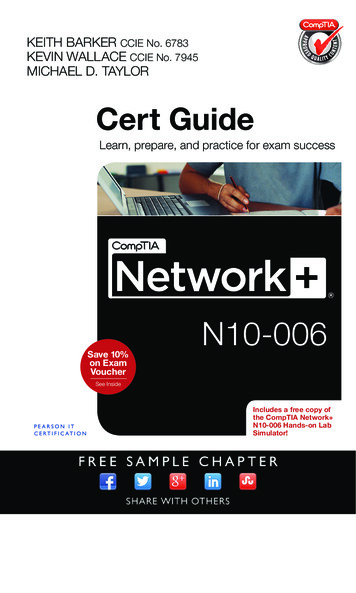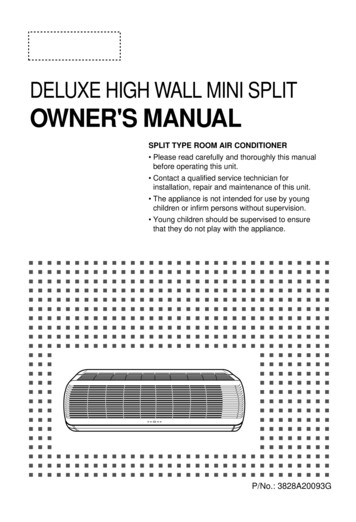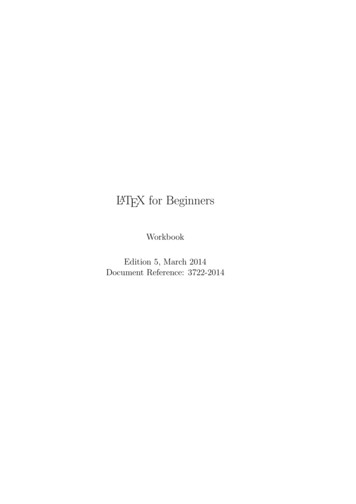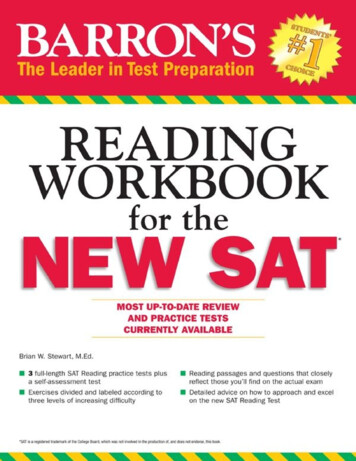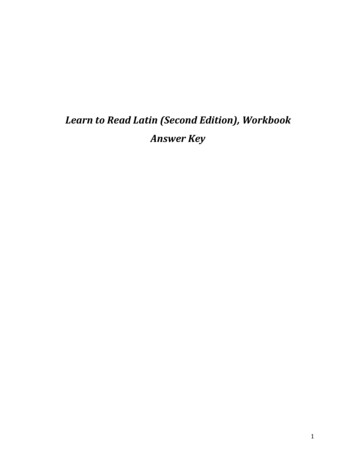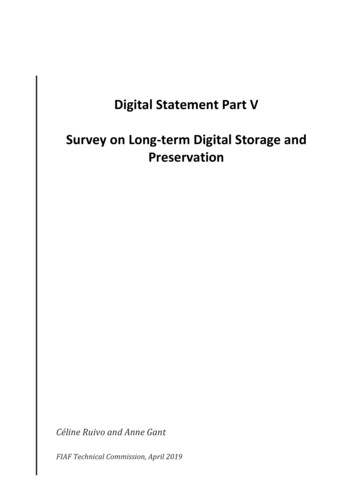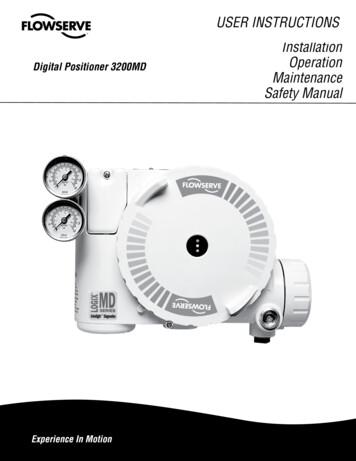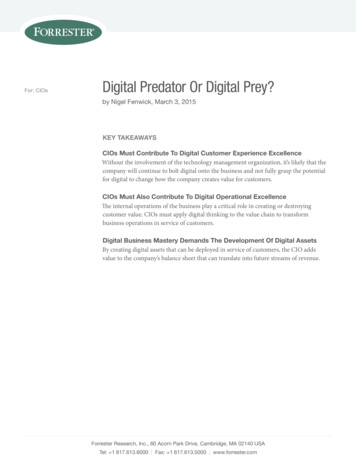
Transcription
GermanDIGITAL EDITION WORKBOOK The fastest way toa new language New Vocabulary, Dialogs &Exercises in Every Chapter Color Illustrations Phonetic Pronunciation& Translations As You Go Verb Conjugations Cultural Immersion withIdioms & Expressions Complete Glossary& Answer Keywww.topics-ent.com
German developed by Mary March, M.A.written by Eva-Maria Barthel, Ph.D. 1
2003 Topics Entertainment, Inc.3401 Lind Ave SW, Renton, WA 98055 l rights reserved. This Digital Edition Workbook PDF was purchased with alicense (individual, not company/organization/institution) to allow the reproduction only by the original purchaser for their own use. It is meantto be printed and used as a workbook for their use in studying. Reproduction of the printed PDF, converting the PDF to another digital format or copying/transmitting the PDF is prohibited. Additional copies of the Digital Edi tion Workbook PDF should be purchased at www.InstantImmersion.com.P O W E R E DB YTME U R O TA L Kdeveloped by Mary March, M.A.written by Eva-Maria Barthel, Ph.D.ISBN 1-59150-310-8Edited by Laura Wideburg, Ph.D.Creative Director: Tricia Vander LeestIllustrations by Elizabeth HaidleArt Director: Paul HaidleDesign by Paul HaidleMaps by Lonely Planet 2
TABLE OF CONTENTSChapter 1Good morning! 6Guten morgen!Chatper 2I’m hungry.Ich habe hunger.12Chapter 3Excuse me! 16Entschuldigung!Chapter 4How much is it? 22Wieviel kostet das?Chapter 5What day is it? 28Welcher Tag ist heute?Chapter 6Is it far? 34Ist es weit?Chapter 7Which season do you prefer?Welche Jahreszeit hast du lieber?40Chapter 8This is my family. 46Das ist meine Familie.Chapter 9It’s too cold.Es ist zu kalt.52Chapter 10 Do you have the time please?Wieviel Uhr ist es?58Chapter 11 What do you do in your free time?Was machst du in deiner Freizeit?64Chapter 12 Did you have a good weekend?Wie war dein Wochenende?70Chapter 13 What do you want to eat?Was möchtest du essen?76Chapter 14 What’s the matter?Was ist los?82Chapter 15 That looks great on you. 88Das steht dir gut.Chapter 16 That’s life!So ist das Leben halt!94Answer Key 100Glossary 106Cultural Pages 1133
INTRODUCTIONWillkommen to Instant Immersion German ! An understanding of other cultures iscritical in becoming part of a larger global community. Knowing how to communicatein other languages is one way to facilitate this process. You have chosen a truly globallanguage to learn. There are diverse German cultures in Germany, Switzerland, andAustria having a worldwide influence on politics, manufacturing, the high-tech industry,literature, philosophy, the arts and music.Now let’s get down to learning some German. Did you know that a large part of theEnglish vocabulary is similar to the German language? This means you already know themeaning of many German words such as: schwimmen (to swim), waschen (to wash), derArme (arm). Other German words look very much like their English equivalents: das Radio,die Banane, das Auto, die Musik are just a few. You just have to learn the pronunciation.(And you will see that learning German pronunciation is not as difficult as you mightthink!)This book will help you learn the basics of communicating in German in a way that willbe fun and easy for you. We include many popular phrases and expressions and showyou how these are used in real life through example conversations and stories. Our bookalso provides an easy pronunciation system that will give you the confidence you need tospeak German. A wide range of interesting and valuable topics give you a firm groundingin the language, including how to order food like a local, how to travel comfortably withinthe country, even what to do when things go ‘wrong’.4
PRONUNCIATION GUIDEThe pronunciation of German is very consistent. Vowels and consonants are pronouncedin the same way no matter how they appear in each word. While English and Germanshare many pronunciation rules, particularly with respect to consonants, differences dooccur. The following chart serves as a guideline when practicing proper pronunciation inGerman.Germanvowels andconsonantsaäee; eeie; i; ieoöuüei; aiauäu; eujgzs; ßchschstspvwapproximate equivalent in Englishlong as in barshort as in pastabadshort as in bed[no direct English equivalent] prolonged e as in buffetor the French caféshort as in islong as in bee or believelong as in nose[where “o” is pronounced longer and lips arerounded]short as in notwordlong as in you or looseshort as in book[no English equivalent; first pronounce the German u,then, with your tongue and mouth remaining in thesame position, pronounce the short German i]eyeouchboyyachtgoodpizzasun, zebra[no English equivalent; pronounce as “k” but instead ofopening the back of your throat, blow air through it]shinemostly pronounced as German sch tmostly pronounced as German sch pfishgenerally pronounced as “v”, as in votenotation in Ygtss,zCHSCHSCHtSCHpfv5
This book has 16 chapters. You can work through the book chapter by chapter or skiparound to the topics that most interest you. Study the expressions and vocabulary beforereading the dialog or story. Say them out loud to practice your pronunciation. Readthrough the dialog or story as many times as you need in order to understand it. Thenread it out loud. Check your answers to the exercises in the Answer Key in the back ofthe book. Finally, get in a German mood! Have a Bratwurst, hike in the mountains withsome Wanderlust, listen to some Beethoven, or snuggle up at home with some Glühwein(hot spiced wine) in an atmosphere of Gemütlichkeit. But have fun learning German!(gooten mo’rgen)Guten morgen!Good morning!(es ist meer egaal)Es ist mir egal.I don’t care.6(es muCHt meer niCHts ous)Es macht mir nichts aus.It’s all the same to me.(lahss u’ns géhen)Lass uns gehen.Let’s go.
VOCABULARY(der mahn)der Mannman(er)erhe(SCHpreCHen)sprechento speak(doo)duyou(der mo’rgen)der Morgenmorning(gooten mo’rgen)Guten Morgen!Good morning!(vo’len)wollenwant(vee gét es deer)Wie geht es dir?How are you?(moCHten)möchtenwould like(néhmen)nehmento take(dahs aabentessen)das Abendessendinner(zee)sieshe(dee frou)die Frauwoman(es gét meer goot)Es geht mir gut.I’m fine.(haaben)habento have(géhen)gehento go(essen)essento eat(dahs mitaakessen)das Mittagessenlunch(der mo’rgen)der Morgenmorning(dahs brotCHen)das Brötchenbreakfast roll(dahs frühSCHtük)das o have breakfast7
DIALOGEs ist Morgen.(mitayn ahnder)Eine Frau und ein Mann-Sabine und Klaus–sprechen miteinander.to each otherSabine: Guten Morgen, Klaus. Wie geht es dir?Klaus: Guten Morgen, Sabine. Es geht mir gut. Und dir?Sabine: Es geht mir gut. Wo möchtest du frühstücken?(weer konen tsoo dem kafé im)Klaus: Es ist mir egal. Wir können zu dem Café(hOtel géhen)im Hotel gehen. Ich möchte ein Brötchen essen.(iCH ouch)Sabine: Ich auch! Lass uns möchtendunehmenBrötchenFill in the blanks using the words in the box below.1. Klaus geht zum2. Wo möchtest3. Zum.?möchte Sabineeinessen.4.möchtest du essen?8
MATCHINGMatch the sentence with the picture.A1. Eine Frau und ein Mann sprechen miteinander.2. Ich auch. Lass uns gehen.3. Das ist mir egal.4. Es ist Morgen.B5. Wo möchtest du frühstücken?C6. Ich möchte essen.FDEFOCUSSUBJECT PRONOUNSIyouhesheitS I N G U L A RPLURALichduersieeswirihrsieSie(iCH)(doo) )(zee) (formal)9
VERB CONJUGATIONS(essen)essento eat(iCH esse etvahs)Ich esse etwas.a little(doo ist flaySCH)Du isst Fleisch.meat(zee ist im outo)Sie isst im Auto.car(er ist ahm SCHtrahnt)Er isst am Strand.beach10(veer essen feel)Wir essen viel.a lot(eer esst pahstah)Ihr eßt Pasta.pasta(zee essen ahm SCHtrahnt)Sie essen am Strand.beach(zee essen im bett)Sie essen im Bett.in bed
NOTESThe formal “Sie” (same as the third person plural, except capitalized) is used to addressindividuals and groups with whom the speaker is not acquainted or to whom the speakerhas only established loose or superficial contact.This includes, for the most part, hierarchical relationships such as superiors at theworkplace or teachers in school. After you have familiarized yourself with the conjugationmodel below, return to the following examples and notice the different verb endings whenusing the formal “Sie” and the informal “du”.FORMAL:Herr Schmidt, wo möchten Sie essen? Mr. Schmidt, where would you like to eat?Nehmen Sie das Buch herr Schmidt? Mr. Schmidt, are you going to take the book?I N F O R M A L : Paul, wo möchtest du essen?Nimmst du das Buch Paul?Paul, where would you like to eat?Paul, are you going to take the book?NEHMENto takeich nehmedu nimmster/sie/es nimmtwir nehmenihr nehmtsie/Sie nehmen(iCH néme)(doo nimst)(er, zee, es nimt)(veer némen)(eer némt)(zee némen)I takeyou takehe, she, it takeswe takeyou takethey/you (formal) takeHere are some common expressions with nehmen:Nimmst du ein Brötchen?Are you having a roll?Ich nehme den Zug.I’m taking the train.Nimm dich in Acht!Watch out!11
INSTANT IMMERSION GERMAN WORKBOOK 16.95 US/ 24.95 CAN PROOF OF PURCHASE Made in the USA TW-51347 . tion Workbook PDF should be purchased at www.InstantImmersion.com. developed by Mary March, M.A. written by Eva-Maria Barthel, Ph.D. ISBN 1-59150-310-8 Edited by Laura Wideburg, Ph.D. Creative Director: Tricia Vander Leest Illustrations by Elizabeth Haidle Art Director:

